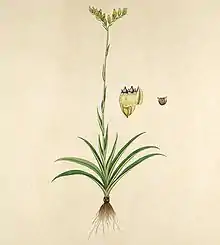Burmannia (plant)
Burmannia is a genus of flowering plants long thought of as related to orchids, although more recent studies suggest closer affinities with either the Dioscoreales or the Melanthiales.[3][4][5] The plants are herbs, partially autotrophic (photosynthetic) but also partially parasitic on soil fungi.
| Burmannia | |
|---|---|
 | |
| Burmannia disticha | |
| Scientific classification | |
| Kingdom: | Plantae |
| Clade: | Tracheophytes |
| Clade: | Angiosperms |
| Clade: | Monocots |
| Order: | Dioscoreales |
| Family: | Burmanniaceae |
| Genus: | Burmannia L. |
| Type species | |
| Burmannia disticha | |
| Species | |
| Synonyms[1] | |
| |
Burmannia is native to tropical and subtropical parts of Africa, eastern Asia, Australia, and the Western Hemisphere. Three are regarded as native to the US:[1][6][7][8][9]
The name Burmannia is a taxonomic patronym honoring the Dutch botanist Johannes Burman (1706 - 1779).[2]
Systematics
Burmannia comprises the following species.[1]
- Burmannia alba - Brazil, Paraguay
- Burmannia aprica - S Brazil
- Burmannia australis - Brazil, Paraguay, Bolivia
- Burmannia bengkuluensis - Sumatra
- Burmannia bicolor - Cuba, N South America
- Burmannia bifaria - Java
- Burmannia biflora - Virginia to Texas; Cuba
- Burmannia candelabrum - India, Assam, Bangladesh
- Burmannia candida - Thailand, Myanmar, Sumatra
- Burmannia capitata - North Carolina to Texas, West Indies, S Mexico, C + S America
- Burmannia championii - S + E + SE Asia, New Guinea
- Burmannia chinensis - E India, Indochina, China, Ryukyu Is
- Burmannia cochinchinensis - Vietnam
- Burmannia coelestis - S + E + SE Asia, New Guinea, N Australia, Micronesia
- Burmannia compacta - S Venezuela
- Burmannia connata - Sumatra
- Burmannia cryptopetala - E Asia
- Burmannia damazii - C + SE Brazil
- Burmannia dasyantha - Colombia, Venezuela
- Burmannia disticha - S + E + SE Asia, New Guinea, N Australia
- Burmannia engganensis - Enggano I in W Indonesia
- Burmannia filamentosa - Guangdong in China
- Burmannia flava - S Florida, Chiapas, Cuba, C + S America
- Burmannia foliosa - S Venezuela
- Burmannia geelvinkiana - W New Guinea
- Burmannia gracilis - S Thailand, W Malaysia
- Burmannia grandiflora - Colombia, C Brazil
- Burmannia hexaptera - Cameroon, Gabon
- Burmannia indica - S India
- Burmannia itoana - China, Japan
- Burmannia jonkeri - Mato Grosso, Goiás
- Burmannia juncea - N Australia
- Burmannia kalbreyeri - C America, NW S America
- Burmannia larseniana - Thailand
- Burmannia latialata - tropical Africa
- Burmannia ledermannii - New Guinea, Palau
- Burmannia luteoalba - Phu-quoc I. in Cambodia; Vietnam
- Burmannia lutescens - Malaysia, Indonesia, Papuasia
- Burmannia madagascariensis - Madagascar, Mauritius, C + S Africa
- Burmannia malasica - S Thailand, SE Kalimantan
- Burmannia micropetala - New Guinea
- Burmannia nepalensis - Himalayas, E + SE Asia
- Burmannia oblonga - Hainan, Indochina, N Sumatra
- Burmannia polygaloides - S. Venezuela, NW Brazil
- Burmannia pusilla - India, Sri Lanka, Vietnam, Cambodia
- Burmannia sanariapoana - S Venezuela
- Burmannia sphagnoides - W Malaysia, Sumatra, W Borneo
- Burmannia steenisii - Java
- Burmannia stricta - S India
- Burmannia stuebelii - N Peru
- Burmannia subcoelestis - Cambodia, Laos, Vietnam
- Burmannia tenella - N + C South America
- Burmannia tenera - Goiás, São Paulo
- Burmannia tisserantii - Central African Rep
- Burmannia vaupesiana - Colombia
- Burmannia wallichii - China, India, Indochina
Notes
- Maburnia is an imperfect taxonomic anagram of Burmannia.[2]
References
- "World Checklist of Selected Plant Families: Royal Botanic Gardens, Kew". apps.kew.org. Retrieved 2017-01-14.
- Burkhardt, Lotte (2018-06-06). Verzeichnis eponymischer Pflanzennamen - Erweiterte Edition. Index of Eponymic Plant Names - Extended Edition. Index de Noms éponymiques des Plantes - Édition augmentée (in German). Botanic Garden and Botanical Museum Berlin, Freie Universität Berlin. p. B118. doi:10.3372/epolist2018. ISBN 978-3-946292-26-5.
- Jonker, F. P. 1938. A monograph of the Burmanniaceae. Mededeelingen van het Botanisch Museum en Herbarium van de Rijks Universiteit te Utrecht 51: 1–279.
- Leake, J. R. 1994. Tansley review no. 69. The biology of myco-heterotrophic (‘saprophytic’) plants. New Phytologist 127: 171–216.
- Wood, C. E. Jr. 1983. The genera of Burmanniaceae in the southeastern United States. Journal of the Arnold Arboretum of Harvard University 64: 293–307.
- "Burmannia in Flora of North America @ efloras.org". www.efloras.org. Retrieved 2017-01-14.
- "2013 BONAP North American Plant Atlas. TaxonMaps". bonap.net. Retrieved 2017-01-14.
- "Burmannia in Flora of China @ efloras.org". www.efloras.org. Retrieved 2017-01-14.
- Govaerts, R., Wilkin, P. & Saunders, R.M.K. (2007). World Checklist of Dioscoreales. Yams and their allies: 1-65. The Board of Trustees of the Royal Botanic Gardens, Kew.
| Wikimedia Commons has media related to Burmannia. |
| Wikispecies has information related to Burmannia (Burmanniaceae). |
This article is issued from Wikipedia. The text is licensed under Creative Commons - Attribution - Sharealike. Additional terms may apply for the media files.